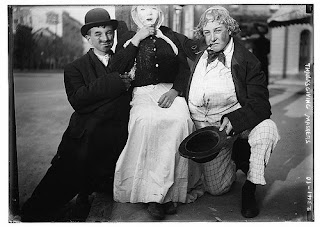Before Halloween came into its own as a holiday in this country, there was “Thanksgiving masking,” where kids would dress up and go door to door for apples, or maybe “scramble for pennies.”
As William Dean Howells put it, "The poor recognize [Thanksgiving] as a sort of carnival," a masculine escape from the family, a day of rule breaking, and spontaneous mirth. Thanksgiving had its own set of rowdies, akin to those at Christmas. Drunken men and boys, often masked, paraded from house to house and demanded to be treated. Boys misbehaved and men committed physical assaults on Thanksgiving as well as on Christmas.
Groups of men, crossdressing, who called themselves the Fantastics or Fantasticals, masqueraded on Thanksgiving beginning in the 1780s. The name Fantastic was English and the practice seems to have been derived from English door to door masquerading for treats. Subsequently the Fantastics copied these and other elements of English mumming, such as drunkenness and ridiculing authority. At the end of the Revolutionary war veterans were dressing up in the rags of the Continental soldiers. The Fantastics paraded in rural and urban areas of eastern and central Pennsylvania, and New York City on Thanksgiving, New Year's Eve and Day, Battalion Day, Washington's Birthday, and the Fourth of July.
The Fantastics disappeared by the 1910s, although the masquerade and carnival cropped up in different incarnations. Misrule at Thanksgiving also appeared in October. Halloween, rather than Thanksgiving, became the holiday for wearing costumes. Children, sometimes dressed in rags or wearing masks, had always followed the Fantastics on Thanksgiving Day, blowing horns and begging. Calling their ritual the Ragamuffin parade, children continued to beg on Thanksgiving. Although some of the child beggars were poor, more privileged ragamuffins in costume demanded coins or treats in New York City or up state New York as late as the 1940s.
Progressive era reformers regarded child begging on Thanksgiving as immoral and thought children who engaged in it should be arrested. The New York Times in November of 1930 worried that demanding coins could teach children to become professional beggars and blackmailers and that children were annoying the public. Begging, decided the paper, was a "malicious influence on the morals of children of the city. Boys' clubs and other child welfare agencies organized parades and costume contests as alternative activities. As a result of these efforts, child begging or masking on Thanksgiving finally disappeared by the 1940s.














